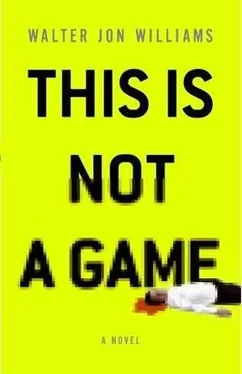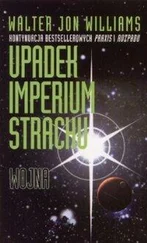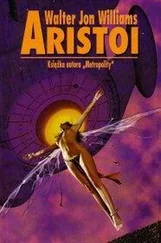No, she thought. Too elaborate. And auditioning Sikh doormen to find out which of them could act would be a time-consuming process.
The dry monsoon had failed to blow away the equatorial heat, and the sun was fierce, but tall trees had been planted on either side of the road to provide shade. She used a flyover to cross four lanes of Jakarta’s insane traffic. The air had the fried-fritter smell of biodiesel mixed with the scent of hot asphalt.
The area was dominated by office towers and hotels, but there were smaller buildings in between with shops and eateries. Billboards and neon signs advertised Yamaha bikes, Anker Bir, and Chandra handsets, the appearance of which made Dagmar smile. Celebrities endorsed beauty products and whiskeys. Street food was available-Dagmar imagined the vendors had to sell their seafood and meats before they spoiled. The smaller shops were open-the single owner, or members of his family, looked out at the street, face impassive-but the medium-size stores, the ones that couldn’t make their payroll in the current situation, were closed. Even in the shade the heat was appalling, so Dagmar stepped into a building that had been converted into a kind of vertical shopping mall, and wandered around in cool air for a while. The international chains, Bok-Bok Toys and Van Cleef and Arpels, were open; the smaller, locally owned businesses, the camera and clothing stores, were closed. There seemed to be few customers in any case, and the goods available for purchase weren’t anything Dagmar couldn’t get at home.
She paused for a moment at an indoor skating rink, a few young people in tropical clothing making lazy circles to the sounds of 1970s American pop.
Back to the heat and the traffic. She made a random turn onto a boulevard shaded by rows of cone-shaped trees, where a series of blocky old office buildings stood with their window air conditioners humming. There was a lot of green in Jakarta-trees, bushes, tropical ferns, and more palms than in L.A. She made another turn and found herself heading toward some kind of square or park-or maybe just a big, empty parking lot. Dagmar saw the open area was filled with people, and that many of them were carrying angry-looking signs and banners; she made a U-turn just as a pair of police vans turned down the street, each filled with men in blue uniforms and white helmets and crossbelts.
Dagmar increased her pace, not about to get between the police and a bunch of pissed-off citizens.
A few blocks away, music boomed out over the street, louder than the traffic. The sound came from a music and video store. The music thundering from its speakers was propulsive: layers of Indian tabla; a harmony line drawn by a chiming synthesizer, a metallic sound influenced by the gamelan; and on top of it all a bubbly 1950s-style pop vocal. Dagmar was completely charmed.
She stepped into the narrow store. Local films glowed from plasma screens, all heroic action, men with bare, blood-spattered torsos, headbands, and krises. The walls were covered with movie posters and pictures of pop stars. There was a row of terminals where customers could download music into portable storage, for transfer into whatever media later suited them.
The fact that this store existed at all told her that most Indonesians still made do with dial-up, assuming that they had Internet at all.
A young man with a Frankie Avalon haircut sat behind a counter up front. Dagmar gave him a nod, and he nodded back, an expression of surprise on his face. Clearly he didn’t see a lot of tourists in here.
Beneath the glass counter were interchangeable plastic cartridges of fuel for miniturbines and a lot of cheap memory storage, sticks and slabs and buttons with pop culture symbols: peace signs, the faces of pop stars and anime characters, popular heroes like Bruce Lee, Che Guevara, and Osama bin Laden, and of course the ubiquitous Playboy rabbit.
It’s a sad world, Dagmar thought, when you have to choose between Osama and Hugh Hefner.
Dagmar was the only customer. She went to one of the terminals where a pair of headphones waited. She took off her faux panama, stashed it atop the monitor, and put on headphones that smelled faintly of someone else’s sweat. The instructions were in Javanese, but she managed to call up a directory and began to sample what was on offer.
There was rap. There was reggae. There was heavy metal and bubblegum pop and classic rock and sappy love songs with far too much reverb. World culture was available to anyone with a T1 connection, and the local people downloaded it, wrung it for meaning, remixed it, rebranded it, uploaded it, and broadcast it onto the street from speakers mounted on the facades of music stores, from off-brand MP3 players, from speakers in taxi cabs, from podcasts and webcasts and radio and audio streamed from thousands of sources, from unlicensed radio stations run by enthusiastic amateurs in Brazilian favelas, by religious fanatics in Sumatran kampungs, by fierce college girls in Kansas with piercings in their navels and anarchy in their hearts…
And by Dagmar, standing atop the massive bandwidth of Great Big Idea Productions in Los Angeles, the media capital of the world. Dagmar, whose job was to take all that culture and history and find, or invent, the collusions and cabals that kept the world dancing… all the content zooming out into the world, where it would join with all the rest and be downloaded and adored and hated and absorbed and remixed again, only now with Dagmar’s fingerprints on it…
Now Dagmar, listening, was worried about how she was going to pay for any content that she downloaded. She figured that the kid behind the counter had no way of breaking one of her twenty-dollar bills, and she still had no local money, not that it would buy much. There was no sign saying the place took credit cards.
She went to the counter and tried talking to the kid, but despite all the rap and classic rock his store had on offer, he had no English at all. She offered credit cards, but he shook his head. She took out Indian rupees and waved them. He looked at them in a businesslike way and took a thousand-rupee note, about twenty dollars U.S., then waved her back to her station.
Dagmar was happy with the exchange, and she congratulated herself that the kid’s family would eat for the next couple of weeks. She took out her cell phone, thumbed the catch that revealed the USB connector, and plugged the phone into her terminal. She began her first download.
There was a few seconds’ pause, and then the phone screen began blinking red warnings at her, and an urgent pip-pip-pip began to sound. She looked at the screen for a startled instant, then yanked the phone from the connector. She reversed the screen to read it and discovered that the download store had just tried to load a virus into her handset.
She looked up at the kid with the Frankie Avalon haircut.
“You little bastard!” she said.
The kid affected nonchalance. What’s your problem, Kafir?
“You tried to steal my shit!” She turned off the phone, with any luck killing the virus, and marched to the counter. She banged the counter with the metal USB connector.
“Give me my rupees back!”
The kid shrugged. The rupees were nowhere in sight.
Dagmar had just about had enough of Jakarta.
“You want me to call the cops?” She looked out the door and to her immense surprise saw three policemen, right on the spot and right on time.
Two policemen, blue shirts and white helmets, rode a motorcycle. The driver kept the bike weaving between the cars stalled in traffic, and his cohort rode pillion, turning to look rearward as he talked into a portable radio.
The third policeman was on foot. He’d lost his white helmet, and blood ran freely from a cut on his forehead.
Читать дальше











